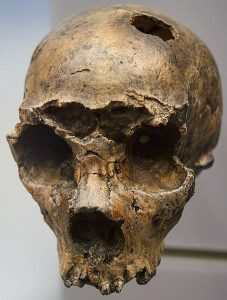Do you know your ancestry? While all humans beings have their own varying histories, many are held together by one ancestral truth. They are all partly Neanderthals! A new Neanderthal woman has been found in Croatia, and the tests being performed on her are changing the way scientists perceive human genealogy.
This discovery may be more impactful news for humans that originated outside of Africa. For those who migrated out of Africa, scientists have cause to believe that Neanderthal DNA accounts for 1.8 to 2.6 percent of their DNA! Considering that the common belief had been that Neanderthals accounted for 1.5 to 2.1 percent, this new knowledge is a great leap forward in understanding the way that evolution and ancestry shape the life of the modern human. The genes that Neanderthals contributed to the modern human may affect cholesterol, mental health, body fat levels, and more. Don’t be too alarmed about the potential negative side effects of sharing Neanderthal DNA, though. The lead author on the study, Kay Prüfer, clarified that Neanderthal DNA is not definitively bad for your health. He said, “We find one variant that is associated with LDL cholesterol, and the variant we got from Neanderthals is associated with lower LDL cholesterol.” So, rest assured. Neanderthal DNA does not mean you will have certain health issues. It only means that you can.
These studies are not only teaching scientists about humans, though. By comparing the bone fragments of the Neanderthal found in Croatia with another Neanderthal found in Siberia, scientists discovered that Neanderthals are extremely similar in DNA to one another. Despite being from different parts of the world, both Neanderthals had strikingly close DNA structure. This closeness in DNA is most likely a cause of a small population. All of this information sheds a light on the low density of the Neanderthal population as well as their way of living.
While this discovery has greatly reshaped the way that we view modern human DNA, research on Neanderthals persists. Scientists hope to find even more information that will teach people about the history of Neanderthals as well as their influence on the human race.



evodrewtion
Wow IFEMURBONE!! This was fascinating to read. After reading this I was curious about how Homo Sapiens interacted with Neanderthals that resulted in our DNA being partly Neanderthal. I found this really interesting source https://genographic.nationalgeographic.com/neanderthal/ which I encourage you to read if you have the time. It gives really interesting background about Homo Sapien’s migration out of Africa including a timeline and facts about the difference in Neanderthal DNA percentages depending on what part of the world you are from. I find the theories about why Neanderthals went extinct that concludes the article very thought-provoking. The theories suggests that the Neanderthals were absorbed by the larger human population. Do you agree with this theory? Do you believe they were instead killed off by the Homo Sapiens? Or do you have another theory? Another topic covered by this article surrounds the impact Neanderthal DNA has on us today. This article cites a Stanford study that concluded that many homo sapiens carry “ancient variants of immune system genes.” I find this entire topic so exciting as it serves as a perfect example of how we just keep continuing to learn in science.